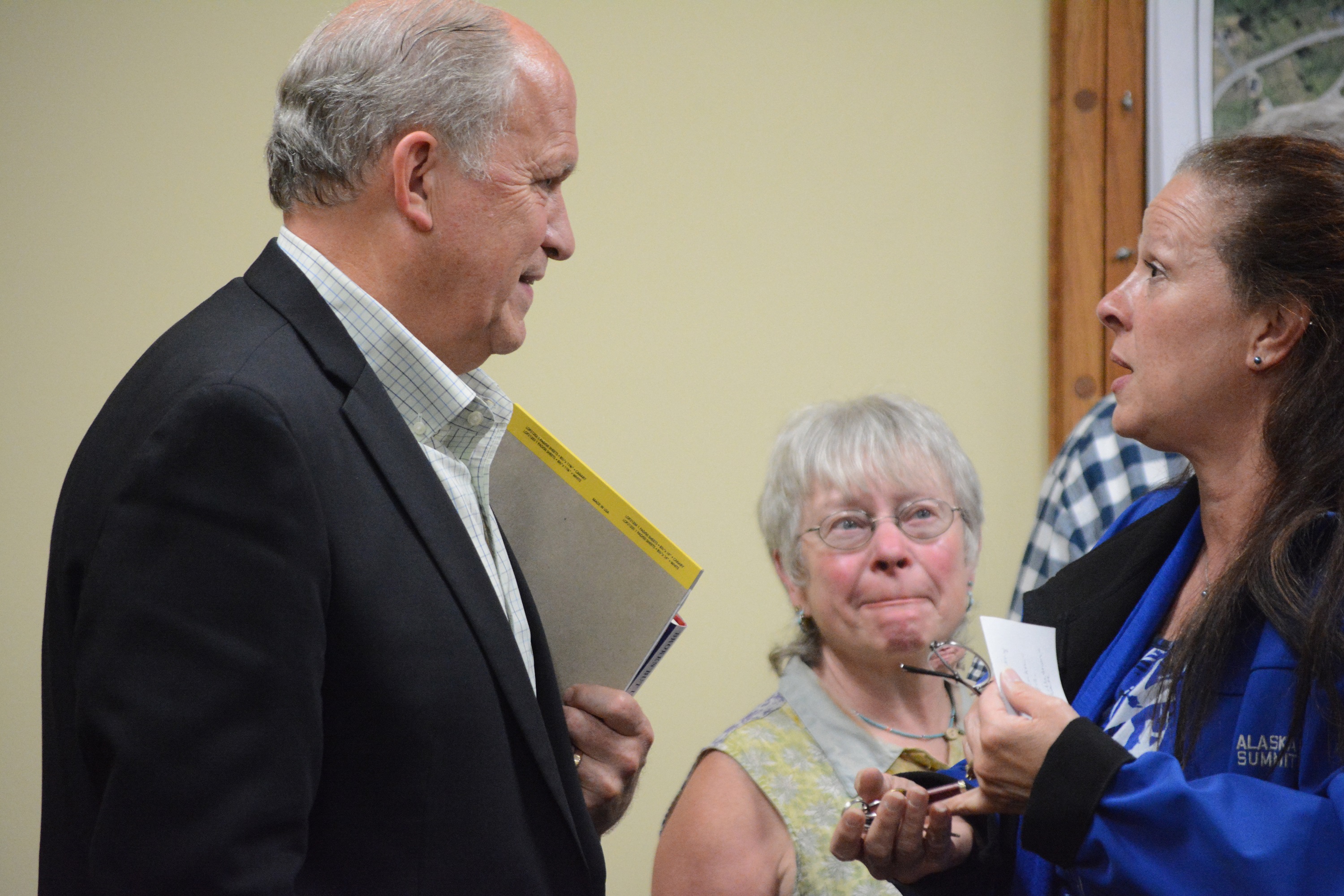In a talk before the Homer City Council on Tuesday, Gov. Bill Walker mentioned a historic photo of Metlakatla villagers Lt. Gov. Byron Mallot gave him. It showed the villagers pulling together to remove a stump — a Tsimshian tradition.
“‘This is what we need to be doing,’” Walker said Mallot wrote on the photo. “We need to find our place on the rope.”
That was Walker’s message as he spoke to citizens and officials about what he called Alaska’s greatest fiscal crisis in its history.
“Alaskans are resilient,” Walker said. “We can pull together because we’ve done that in the past.”
Along with the council talk, the governor and First Lady Donna Walker visited Homer to tour a local farm and speak to a combined meeting of the Homer Downtown and Kachemak Bay Rotary Clubs at Land’s End Resort. Instead of summer governor’s picnics, Walker has been visiting Alaska cities and local governments to impress upon them the need to address a $4.1 billion deficit in Alaska’s budget. With declining oil prices, Alaska’s main source of revenue has dried up to about $1.2 billion a year.
“I know it’s a bit unusual to do that. Governors haven’t done that in the past,” Walker said. “We try to meet as many council members and members of the public as we can.”
Walker’s visit comes out of frustration with the Alaska Legislature which failed to act on his 9-point plan to address the gap between declining oil and gas revenues and funding state government. Of his proposals, only one passed, an increase in fishing and hunting fees that will raise about $9 million.
The Legislature passed a budget that makes up part of a deficit by dipping into the Constitutional Budget Reserve. Budget analysts say the CBR only has enough left to fund the state budget for another two years. Rep. Paul Seaton, R-Homer, said he anticipates a 25-percent budget cut if the CBR is used to fund those budgets. Walker said that since 2013 state spending has been reduced 40 percent.
“I know what will happen if we don’t fix this. In two to three years we won’t have any Permanent Fund Dividends,” Walker said. “I know what would happen if we continue to wait and go through our savings and draw $3 billion off our savings.”
In a press conference with local reporters at KBBI Public Radio, Walker said he was disappointed the Legislature didn’t take action to solve the fiscal crisis. In response to a question from the Homer News asking if legislators might be waiting to see what happens after the fall election, Walker said “I think that may be correct for some, to sit back and not doing anything until after the election, knowing that some of the tools you pick up might be politically uncomfortable so you don’t touch any of them.”
In his talk before the council, Walker acknowledged that the failure to address state deficits will cause problems for local governments.
“Deficits roll downhill,” he said. “That’s what concerns me. If we don’t fix this, that doesn’t fix the problem. It becomes your problem.”
A solution of raising revenues through a state sales tax won’t be helpful to local governments, Walker said.
“We know that a lot of times sales taxes are a source of revenue. If we stack ours on top of yours it’s going to be uncomfortable,” he said. “That’s why we looked at an income tax.”
An income tax would have one benefit, Walker said, noting $2.6 billion in nonresident wages that go south.
“We want to invite them to be a solution,” he said.
Walker praised Seaton for proposing a revenue plan that combined an income tax and allocating half of Permanent Fund Dividends into the general fund. Walker said he welcomed ideas like that — even criticism.
“I don’t mind being attacked, but I say, ‘What is your plan?’”
At that news conference, he elaborated on that.
“I feel like I’m in a boat taking on water and I’m the only guy with a bucket,” he said.
Council member Heath Smith said he’s heard criticism from constituents that the state allowed budgets to grow to the point they become unaffordable.
“Maybe we should never have reached the level as far as spending, as far as a sustainable budget,” Smith said. “We will now be rewarding the Legislature for building a budget that is unsustainable. They don’t feel so good about that.”
Walker said he was glad to hear the word “sustainable.” That’s the challenge, he said. The budget has to be sustainable regardless of the price of oil.
“Embrace the solutions. It takes 5 miles to turn an oil tanker. We’re going to find out how long it takes to turn a state and turn it back to where it used to be, where the resources don’t pay for all the revenues,” Walker said. “I’m optimistic that we will get this done, because we have to. The price tag of not fixing Alaska is too great.”
Michael Armstrong can be reached at michael.armstrong@homernews.com.


